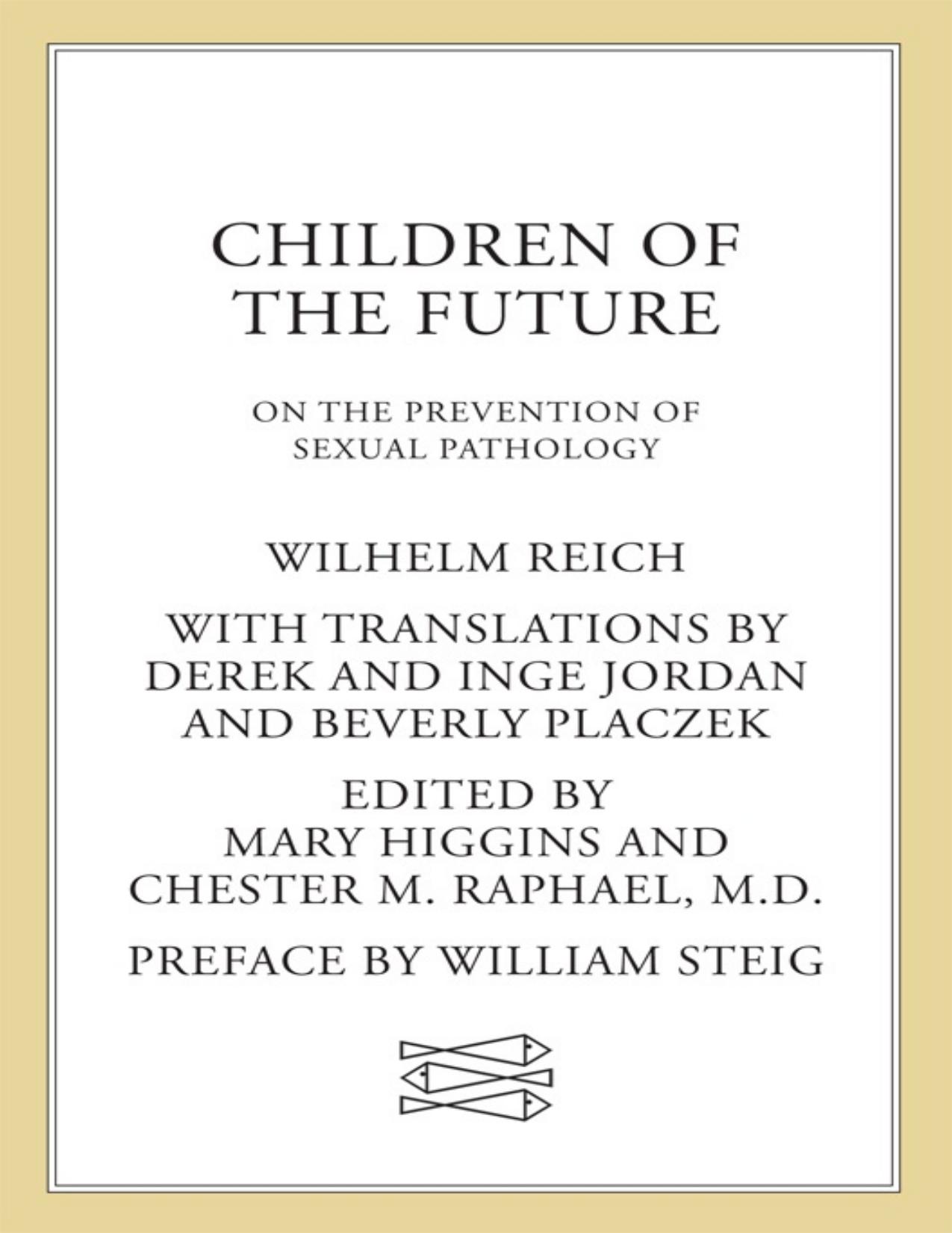Children of the Future by Wilhelm Reich

Author:Wilhelm Reich
Language: eng
Format: epub, pdf
Publisher: Farrar, Straus and Giroux
Falling Anxiety in a Three-Week-Old Infant
I recently had the opportunity to observe the development of falling anxiety in a three-week-old infant. This observation filled a gap in my investigation of the cancer biopathy.
The infant in question was born into an environment in which the expressive language of the organism is professionally understood and used. It was, therefore, all the more disconcerting that the parents felt helpless when confronted with the gesture language of an infant. They had the impression that nothing at all is known about the emotional life of the newborn child. The emotional needs of the infant are, of course, in no way satisfied by purely mechanical care, which is given in response to only one form of communication, namely, crying. This one form covers countless large and small needs, from the irritation of a diaper crease to colic. The infant’s other modes of expression meet with no response from the environment.
I shall refrain from discussing here those damaging kinds of infant care that modern education has already eliminated from the world or is still combating: the rigid apportioning of food and inflexible adherence to feeding times à la Pirquet; forcible extension of the legs by tight swaddling; denial of the breast during the first twenty-four hours, as still practiced in many hospitals; overheating of nurseries; the routine treatment of infants in large institutions; the practice of letting infants “cry themselves out,” etc. Such compulsive measures express the parents’ and physicians’ inimical attitudes toward life. Their effect is immediate postnatal damage to the biological self-regulation of the organism, creating the basis for a later biopathy, which is then misinterpreted as hereditary taint. All this is known today, even though it may not yet have had an impact on common practices in child care.
I would like to limit myself here to one specific damaging influence in the first weeks of life that has been neglected until now: the lack of orgonotic contact, of a direct physical or psychological nature, between the infant and the person who takes care of it. The capacity to understand the infant’s language of emotional expression depends directly upon the closeness of this contact; the more complete the orgonotic contact, the better the understanding.
The most salient place of contact in the infant’s body is the bioenergetically highly charged mouth and throat. This body organ reaches out immediately for gratification. If the nipple of the mother reacts to the infant’s sucking movements in a biophysically normal manner with sensations of pleasure, it will become strongly erect and the orgonotic excitation of the nipple will become one with that of the infant’s mouth, just as in the orgastically gratifying sexual act, in which the male and female genitals luminate and fuse orgonotically. There is nothing “abnormal” or “disgusting” in this. Every healthy mother experiences the sucking as pleasure and yields to it.
However, about 80 percent of all women suffer from vaginal anesthesia and frigidity. Their nipples are correspondingly anorgonotic, i.e., “dead.” The mother may develop anxiety or
Download
This site does not store any files on its server. We only index and link to content provided by other sites. Please contact the content providers to delete copyright contents if any and email us, we'll remove relevant links or contents immediately.
Rewire Your Anxious Brain by Catherine M. Pittman(18654)
Talking to Strangers by Malcolm Gladwell(13370)
The Art of Thinking Clearly by Rolf Dobelli(10489)
Mindhunter: Inside the FBI's Elite Serial Crime Unit by John E. Douglas & Mark Olshaker(9343)
Becoming Supernatural by Dr. Joe Dispenza(8217)
Change Your Questions, Change Your Life by Marilee Adams(7781)
Nudge - Improving Decisions about Health, Wealth, and Happiness by Thaler Sunstein(7707)
The Road Less Traveled by M. Scott Peck(7603)
The Lost Art of Listening by Michael P. Nichols(7506)
Mastermind: How to Think Like Sherlock Holmes by Maria Konnikova(7347)
Enlightenment Now: The Case for Reason, Science, Humanism, and Progress by Steven Pinker(7313)
Win Bigly by Scott Adams(7198)
The Way of Zen by Alan W. Watts(6614)
Daring Greatly by Brene Brown(6513)
Big Magic: Creative Living Beyond Fear by Elizabeth Gilbert(5771)
Grit by Angela Duckworth(5615)
Ego Is the Enemy by Ryan Holiday(5448)
Men In Love by Nancy Friday(5240)
The Laws of Human Nature by Robert Greene(5208)
